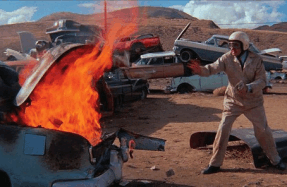Revisiting Marco Ferreri

“I am half feminist and half misogynist.”
—Marco Ferreri (1928–1997)
The 20th anniversary of Marco Ferreri’s death failed to elicit much attention, the exception being Anselma Dell’Olio’s valuable documentary, presented at this year’s Venice Film Festival, Marco Ferreri: Dangerous But Necessary. Eschewing biographical linearity, the documentary explores the prescient significance of Ferreri’s work rather than dwelling on personal anecdotes about his life, either personal or artistic. The documentary implicitly proves that Ferreri’s authorial mark was self-effacing, as his films are more prominent and memorable than the director himself. Yet Ferreri’s films remain unfit for celebratory sanctimony, too uncomfortably relevant to our current predicament to be canonized— and even prophetic, had this term not been abused to the point of insignificance. Almost 30 years before Spike Jonze made Her (2013), Ferreri cast Christopher Lambert in I Love You (1986), the story of a man who falls in love with an electronic keyring. Shaped in the face of a woman, the keyring electronically squawks, “I love you” every time the alienated protagonist whistles, providing all necessary warmth and care.
In the Year Zero AW (After Weinstein), Ferreri’s cinema constitutes a confrontational reckoning with the long and tortuous river of gender asymmetry. He had diagnosed the early symptoms of the alpha male’s violent (1978). Set against the phallocratic skyline of Manhattan, the film sees Marcello Mastroianni and Gérard Depardieu rescuing the son of King Kong, the ultimate symbol of bestial masculinity, whose corpse lies on the shores of a post-apocalyptic, ratinfested Manhattan. Depardieu plays a lightning technician who works in an off-Broadway theatre and in a wax museum dedicated to ancient Rome that burns down in the climactic finale. One day after spraying a troupe of feminist actresses with a bottle of Coca- Cola, the semen of consumerism, he’s raped by them. Even more graphic is the end of 1976’s claustrophobic —the protagonist (Depardieu again), after failing to manage his urges, castrates himself with an electric knife. The irreversible and politically incorrect realization that patriarchy was already sleepwalking towards historical impotence was an intrinsic part of Ferreri’s perceptive vision. Through the prism of his cinema, our social agony is refracted in ways that, though seemingly absurd, lay bare the existential inadequacy contemporary men and women are still experiencing.
You’re reading a preview, subscribe to read more.
Start your free 30 days





